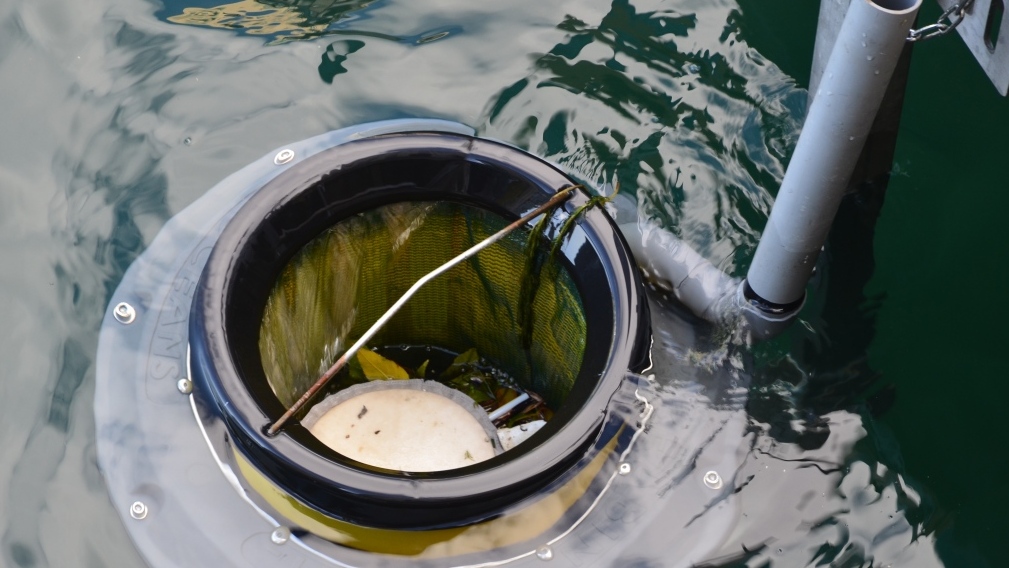Nearly 100,000 pieces of plastic removed from the Toronto Harbour. Here's what else was found
The team behind Toronto’s Trash Trapping Program Network says it removed close to 100,000 small pieces of plastic from the city’s harbour last year.
PortsToronto, in partnership with the University of Toronto’s so called “Trash Team,” said they caught 92,891 pieces of pollution between May and September through the use of 10 Seabins -- which are positioned near the water’s surface and suck trash into a catch bag with a pump.
- Download our app to get local alerts on your device
- Get the latest local updates right to your inbox
“Seven U of T Trash Team research assistants worked daily throughout the summer to empty PortsToronto’s Seabins and quantify and characterize what we diverted from Lake Ontario,” Dr. Chelsea Rochman, Head of Operations at the U of T Trash Team, said in a news release issued Wednesday.
In addition to the Seabins, the program also removed thousands of pieces of trash using a device called a LittaTrap, which are placed in storm drains throughout the Queens Quay area, as well as skimming the surface water in the harbor to divert a total of 96,208 pieces of waste between all three methods.
By weight, the program removed 118.15 kilograms of anthropogenic (originating from human activity) debris and microplastics, which PortsToronto said can harm wildlife and contaminate drinking water.
 A Seabin is seen in this undated image.
A Seabin is seen in this undated image.
The top 10 large items of debris caught in 2022 include:
- Plastic film
- Plastic fragments
- Cigarette butts
- Foam
- Food wrappers
- Plastic bottle caps
- Paper
- Plastic cigar tips
- Plastic bags
- Plastic bottles
Also found, and for the first time in the four years of the program, were dozens of “fatbergs,” which PortsToronto describes as “rock-like masses” formed by the combination of fat, grease, and wastewater materials including wet wipes and diapers.
“In 2022, PortsToronto Seabins collected more than 100 fatbergs, a powerful reminder to residents of the city to consider carefully what is washed down the drain,” the group said.
PortsToronto President and CEO RJ Steenstra said he was “encouraged” by the progress made by the program so far amid a rise in plastic pollution that he believes “seriously threatens the sustainability and biodiversity” of the city’s lakes and waterways.
“[We] look forward to continuing to learn from waste collected by trash-capturing devices like Seabins here at home and worldwide as part of the International Trash Trap Network in an effort to educate, change behaviour and ultimately preserve our waterways for future generations,” Steenstra said.
To read the full 2022 report, click here.
CTVNews.ca Top Stories

Wrongfully convicted N.B. man has mixed feelings since exoneration
Robert Mailman, 76, was exonerated on Jan. 4 of a 1983 murder for which he and his friend Walter Gillespie served lengthy prison terms.
Can the Governor General do what Pierre Poilievre is asking? This expert says no
A historically difficult week for Prime Minister Justin Trudeau and his Liberal government ended with a renewed push from Conservative Leader Pierre Poilievre to topple this government – this time in the form a letter to the Governor General.
opinion Christmas movies for people who don't like Christmas movies
The holidays can bring up a whole gamut of emotions, not just love and goodwill. So CTV film critic Richard Crouse offers up a list of Christmas movies for people who might not enjoy traditional Christmas movies.
More than 7,000 Jeep SUVs recalled in Canada over camera display concern
A software issue potentially affecting the rearview camera display in select Jeep Wagoneer and Grand Cherokee models has prompted a recall of more than 7,000 vehicles.
New York City police investigate death of woman found on fire in subway car
New York City Police on Sunday were seeking a man they believe is connected to the early morning death of a woman who was sleeping on a stationary subway train before she was intentionally lit on fire.
Pickup truck driver killed by police after driving through Texas mall and injuring 5
A pickup truck driver fleeing police careened through the doors of a JCPenney store in Texas and continued through a busy mall, injuring five people before he was fatally shot by officers, authorities said.
10 hospitalized after suspected carbon monoxide poisoning in Ottawa's east end
The Ottawa Police Service says ten people were taken to hospital, with one of them in life-threatening condition, after being exposed to suspected carbon monoxide in the neighbourhood of Vanier on Sunday morning.
'I'm still thinking pinch me': lost puppy reunited with family after five years
After almost five years of searching and never giving up hope, the Tuffin family received the best Christmas gift they could have hoped for: being reunited with their long-lost puppy.
Two U.S. Navy pilots shot down over Red Sea in apparent 'friendly fire' incident, U.S. military says
Two U.S. Navy pilots were shot down Sunday over the Red Sea in an apparent 'friendly fire' incident, the U.S military said, marking the most serious incident to threaten troops in over a year of America targeting Yemen's Houthi rebels.


































